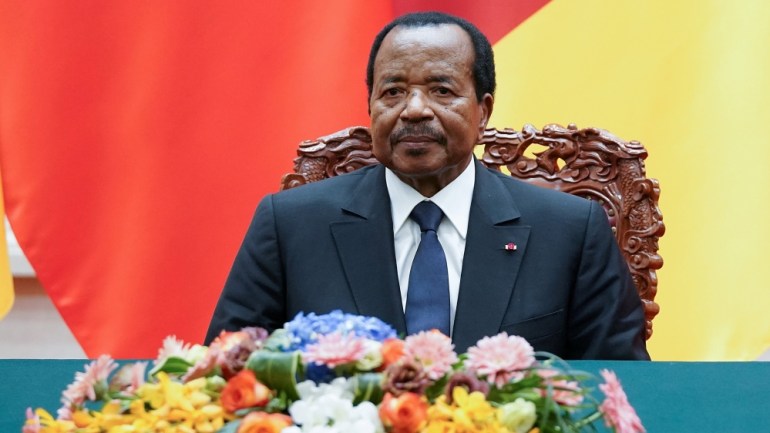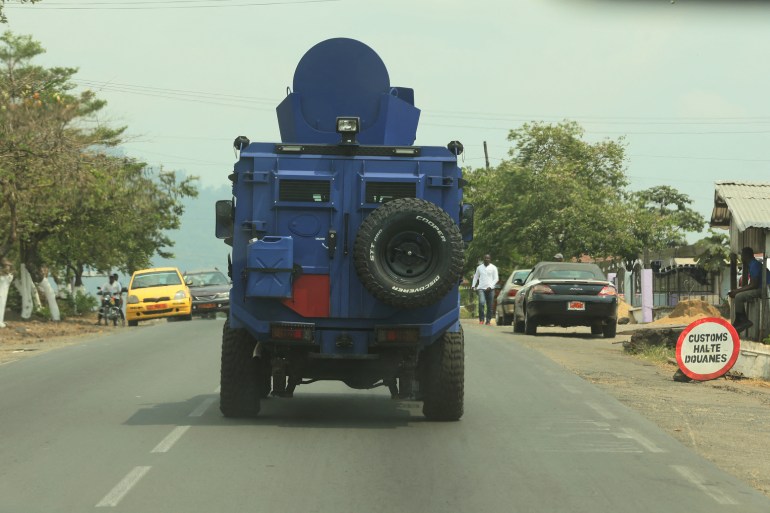Where is Cameroon’s Paul Biya – and why is his life a taboo subject?
The absence of the President of Cameroon, Paul Biya for a month in the eyes of the public is causing strong opinions about his life and raising fears of a power struggle after Biya among the political parties in the central African country.
Biya, who has long faced health concerns, often disappears for weeks, only to reappear. The long absence affects the day-to-day operations of a country that faces many challenges, including a secessionist war in the west, and an armed conflict in the north, analysts say.
Here’s what you need to know about Biya’s disappearance and why Cameroonians are worried about the post-Biya era:
Why is there speculation?
Biya has not appeared in public since September 8, after he attended the China-Africa summit, along with several of the continent’s leaders, in Beijing.
The official opening, this September 5, 2024, of the Conference on Cooperation between African Countries.
I carefully followed the ten-point program proposed by HE Xi Jinping as part of the vision of strategic cooperation with Africa.#PaulBiya#Cameroon#FOCAC2024 pic.twitter.com/Cq6OSp8Au9– President Paul BIYA (@PR_Paul_BIYA) September 5, 2024
The President has canceled attendance at many high-level meetings where he was expected. He did not attend the United Nations General Assembly in September. He also did not appear at the International Association of La Francophonie, a conference of French-speaking countries, held on October 4 in Paris.
Civil society and opposition leaders in Cameroon have called for clarification on Biya’s whereabouts. Christian Ntimbane, a lawyer and politician who is determined to run for the upcoming presidential elections in 2025, has written an open letter to the officials saying, “If he is on leave, say so. If you are sick, say so too.”
Before he disappeared, Biya was scheduled for a summer of talks, starting with the opening ceremony of the July Olympics in Paris. On August 15, he also attended the 80th anniversary celebration of the Allied landings in Provence, in the south of France, during the Second World War.
Critics say his absence is telling. Especially when the country stands at a crossroads: the secession war for independent Ambazonia in the English-speaking west has been raging since 2017, leading to the death of at least 6,000 people, and the displacement of another 700,000 people of the International Crisis Group.
In the north, the armed group Boko Haram, which was based in the neighboring country of Nigeria, has for many years expanded its operations, starting to attack Cameroon in large numbers. Meanwhile, many people in the country are out of work, as the country faces high food and energy prices due to its reliance on volatile oil revenues, according to the World Bank.
What did the government say?
Officials initially tried to play down Biya’s absence from public events, saying he was in good health in Switzerland – where he is believed to have gone after the Beijing summit.
Communications Minister Rene Sadi said in a statement earlier in October that speculations and rumors about the president’s health “have nothing to do with reality” and are “plain dreams”. Sadi added: “The head of state is doing well and will return to Cameroon in the next few days.”
However, those promises had little effect. On October 9, the Minister of Internal Affairs, Paul Atanga Nji, banned the Cameroonian media from “discussing” and reporting on Biya’s health, saying it was a matter of security, and that ” disturbed the peace” of the Cameroonian people.
In a letter addressed to local governors of the country’s 10 states, Nji said further discussions on the health of the president will be punished, warning that anyone who violates the order “will face the full force of the law”. . Nji also ordered the governors to set up “surveillance cells” to monitor internet content.
Journalists and media outlets in the country and beyond have criticized the ban as an attempt to silence the press. Although it is not uncommon for journalists to be targeted or arrested in the country, a specific law that prohibits discussion of Biya’s health is new territory, analysts say.
“Trying to hide behind national security on such a big issue of national importance is extreme,” said Angela Quintal, head of the Africa program at the Committee to Protect Journalists (CPJ), a group of media rights advocacy, said in a statement.

How common is this in Cameroon?
This is not the first time the president has been away for weeks, and it is not new for Cameroonians to face uncertainty about his health.
At 91, Biya is Africa’s second longest-serving leader. He came to power in 1982 and is Cameroon’s second president since independence from France in 1960. His 42-year reign is second only to 82-year-old Teodoro Obiang Nguema Mbasogo, who served for 45 years ruled Equatorial Guinea.
Biya’s long absence from the public eye and his palace in Cameroon’s capital Yaounde has earned him the nickname “the wandering president”. A five-star hotel in Geneva, Switzerland, is known to be Biya’s favorite place. She is thought to be in Europe for treatment, but she also continues to go shopping. His wife, Chantal Biya, is famous for her expensive taste.
By 2018 Biya was no longer involved in official travel, spending the equivalent of four-and-a-half years on “secret short trips” to Europe, according to research by the Organized Crime Reporting Project and Corruption (OCCRP). In 2006 and 2009, the president spent nearly a third of the year abroad, according to researchers. OCCRP found that a day’s stay at his favorite hotel in Geneva, along with his official entourage, costs $40,000.
The long absence “causes a governance gap, characterized by decision-making paralysis and administrative inefficiency,” pro-democracy activist Kathleen Ndongmo told Al Jazeera. “No one really knows who is leading the country. This lack of clear leadership constantly erodes public trust, fuels political instability, and undermines accountability,” he added.
In 2016, when lawyers and teachers from the Anglophone regions of the west protested against alleged discrimination by the predominantly French-speaking government, Biya was absent — even as security forces fired on the protesters. This operation became a conflict in 2017 between separatist groups and the Cameroonian government, which is still ongoing.
Biya’s absence has become more visible, as many citizens have to rely on odd television addresses to see him.

The political war continues?
In the absence of the president, some in the country are worried about a possible conflict between the parties of the political elite who want to rule after Biya in Cameroon.
Although Cameroon has a multi-party system, and there are periodic general elections, Biya’s ruling Cameroon People’s Democratic Movement (CPDM) has always swept the elections and controlled the government.
But Biya is not known to have trained anyone as a potential successor. There is strong speculation that his son, Franck Biya, may be the preferred candidate, but the son is known to keep a low profile, revealing little about his political ambitions. Last October, a 53-year-old man visited the site of a mudslide that killed 30 people in Yaounde – although not in an official capacity. He did not speak to the media during the visit, adding further confusion.
Opposition parties have spoken out strongly against the continued Biya dynasty. Meanwhile, local reports suggest that within the ruling CPDM party, leaders have neither accepted nor spoken against the possibility of Biya’s candidacy. Some officials of the party and many smaller parties that have joined, have ‘encouraged’ the elder Biya to run for another term.
“Cameroon is an invisible pool where even key players cannot explain the ‘big picture’ they are caught in,” said pro-democracy activist Ndongmo, adding that there is already ” civil war” within the regime regarding succession.
“This tactic does not stop, the camps change every day. The post-Biya period will not be good if the party does not end up as the clear winner then,” he said.
#Cameroons #Paul #Biya #life #taboo #subject